
SERGIO DE ALBA was at Home Depot recently when a former student — now 32 years old — ran up to him. “’Mr. de Alba!’” he recalls her saying. “’How is our garden? Are my handprints still there?’”
She was referring to what is now one of 16 ecosystem- themed gardens on the grounds of R.M. Miano Elementary School in Los Banos, where de Alba teaches and has overseen an expansive garden project researched, designed, planted and maintained by students. Participating students leave handprints in surrounding cement and get their names memorialized on a plaque.
“For the past 22 years she had remembered the garden,” says de Alba, who conceived the project and uses the gardens to teach subjects including environmental science, agriculture, economics, math and engineering as well as to bring students and families together.
“That’s my biggest motivation — I want these kids to see their school as their own.”
De Alba has a long list of recognitions for his innovative approaches to learning — the most recent including the 2023 Presidential Innovation Award for Environmental Educators, administered by the U.S. Environmental Protection Agency in partnership with the White House Council on Environmental Quality. He also just won a CTA Institute for Teaching 2023-24 grant — his second — that builds on Miano’s garden project to focus on climate change and other environmental issues, money management while running an on-site plant nursery business, and deepening learning around STEM and art.
A member of Los Banos Teachers Association, de Alba teaches mostly 4th-6th grades and says his lessons are grounded in social studies and science. “If you use whatever you’re most passionate about it comes out in the lesson — so for me math, language arts, everything goes through science and social studies.”
The gardens, of course, teach much more than academics. In addition to serving as a hub for student-parent engagement and a business operation where students market and sell plants to the community, they’re a showcase for student creativity. One garden designed by a 6th grader is in the shape of a tree, with the trunk and branches forming walkways and the the abundant “leaves” being the plants; it’s visible on Google Earth. Another has a circular table in the center, with triangular areas for fruit and vegetable plants shooting out so they resemble sun rays.
“Kids are so imaginative,” de Alba says. The gardens let students “leave a mark in a positive way. Kids can see our trust in them — ‘here are our ideas and you [adults] allow them to come to fruition.’ That’s powerful for them.”
De Alba’s overall teaching is centered on developing the whole child and helping learners discover their gifts and talents while focusing on relevant issues in their community — his community. Born and raised in Dos Palos, “I grew up in same type of environment and conditions as my students.” While Los Banos, a short distance away and now his home, has become a bit of a Silicon Valley commuter town, Miano Elementary serves a high number of socioeconomically disadvantaged and English language learners, whose lives mirror de Alba’s as a child of Mexican immigrants.
He has spent the past 22 years teaching at Miano, and also researching and developing STEM and social studies programs focused on rural communities. The gardens combine education with the livelihood and expertise of many students’ families in mind, furthering his aim to reduce inequities in K-12 STEM education. “I want to give these kids every opportunity to get to the next level, that’s how I see my role as an educator,” he says.
De Alba, who with his wife and fellow Miano teacher Eliane have two daughters (Linda and Ema), spends a lot of his own funds to keep the gardens running. In addition to securing occasional grants, he and his students pick up extra cash by recycling bottles and cans. Organic fertilizers and amendments alone, he says, cost almost $1,000 a year. The gardens are open to all Miano educators and their students but since it is a teacher-led project and not maintained by the school district, de Alba relies on teachers, students and parents to help care for them.
To him, it’s all worth the time and money. He notes that the former student he ran into in Home Depot runs a landscaping business — an outcome influenced, perhaps, by her time at Miano.
“When I was a kid, my mama used to make me water all her plants and I hated that daily chore,” he recalls. “Then when I went to college, I missed it and bought plants to care for. This is a perfect example of the power of experience; you never know when something you may have not wanted to do changes your perspective and provides unexpected joy.
“The gardens now bring happiness to my life, and I hope to instill this same emotion in the students I serve.”



The Discussion 0 comments Post a Comment